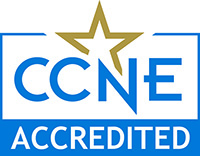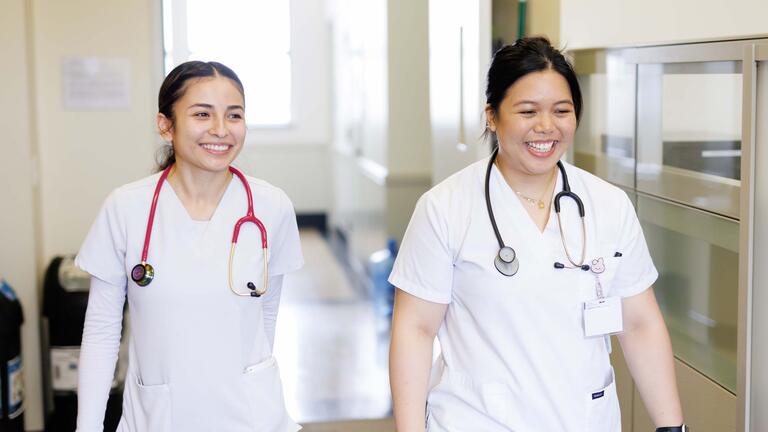

Program Overview
Core Curriculum
Cura personalis, or the philosophy of "care for the whole person", is at the heart of our core curriculum. It’s a principle that has guided our graduates’ minds, bodies, and spirits for generations. The core curriculum, a collection of six required areas totaling 44 credits, is required for all undergraduate students pursuing a bachelor’s degree.
Learn more about the core curriculum
In my clinical and interpersonal experiences, I have witnessed how healthcare legislation has barred members of my own community from receiving the care they so deserve. I attended the AACN Student Policy Summit with the Dean to bridge gaps between generations, power dynamics, and communication styles through advocacy."
Nikaella Mariano, BSN'26
Prerequisites
Clinical prerequisites include courses on the following topics:
- Human Anatomy
- Human Physiology
- Microbiology
- General Psychology
L.V.N. 30 Unit Option
Mandated by California Administrative Code, Title 16, Article 3, Section 1429.
The purpose of the 30-unit option for licensed vocational nurses (LVNs) is to provide the nursing coursework and clinical practice for the LVN so that person will be eligible to apply for the examination for licensure as a Registered Nurse in the State of California. The RN license obtained by this method may not be accepted by all states.
This option is NOT part of the University of San Francisco baccalaureate nursing program and does NOT lead to a BS in Nursing degree nor any other degree.
Requirements:
In order to participate in this option, the student must:
- Be a licensed vocational nurse.
- Have completed the application process at USF as a matriculated student or as a "Special Status" student.
- Have successfully completed courses in physiology and microbiology comparable to such courses as required for licensure as a Registered Nurse.
Academic Credit for Military or LVN Education/Experience
Students in the University of San Francisco (USF) School of Nursing and Health Professions (SONHP) pre-licensure nursing programs (BSN or ME-MSN) may be eligible to receive academic credit for U.S Military education/experience or LVN education/experience.
-
Academic Transfer Credit or Course Waiver for Admitted Students with Military Service Education and Experience OR Licensed Vocational Nurse (LVN) Education and Experience
(California Code of Regulations, Title 16, Article 3, Sections 1423.1; 1423.2; 1424(d)(3)(4), 1426(d)(1), and 1430)
Students in the University of San Francisco (USF) School of Nursing and Health Professions (SONHP) pre-licensure nursing programs (BSN or ME-MSN) may be eligible to receive academic credit for U.S Military education/experience or LVN education/experience.
Academic Credit for Military Education/Experience
Eligibility for academic credit for admitted students with military service education and experience is limited to students who have an academically accepted certification or official transcript to validate a service member's military occupational experience and training equivalent to USF SONHP course or courses.
Theory and clinical practice requirements of the curriculum may be adjusted in recognition of military education and experiences of the student, through an individualized instructional plan that results in meeting the same course objectives and competency standards.
Academic Credit for LVN Education/Experience
Eligibility for academic credit for admitted students with LVN education/experience is limited to students who have an official transcript to validate prior education in an accredited LVN program, successfully completed the NCLEX-VN, and are licensed vocational nurses.
Note that per the California Code of Regulations, Title 16, Article 3, Section 1429, USF SONHP provides a 30-unit option for licensed vocational nurses (LVNs). The 30-unit LVN option provides the nursing coursework and clinical practice for the LVN so that the person will be eligible to apply for the examination for licensure as a Registered Nurse in the State of California. The RN license obtained by this method may not be accepted by all states. This option does not lead to a BSN or MSN degree in the USF SONHP, nor any other degree. In order to participate in this option, the student must:
- Be a licensed vocational nurse.
- Have completed the application process at USF as a matriculated student or as a "Special Status" student.
- Have successfully completed courses in physiology and microbiology comparable to such courses as required for licensure as a Registered Nurse.
The USF SONHP will decide on a case-by-case basis what credit recommendations can be accepted or rejected. The clinical portion of theory-clinical courses in specialty clinical practice settings are not eligible for course equivalency or challenge exams. Credit for courses in the advanced practice nursing (APRN) curricula are not permitted.
Two options for obtaining course credit are provided. Students can appeal for one or both options:
- By review of the official transcripts and pertinent course syllabi from previous education and training.
- By successful completion of challenge examinations.
Option #1 Transfer Credit for Course Equivalency:
Experienced pre-licensure faculty members and Prelicensure Program Director or Assistant Director will conduct a systematic review of submitted documents, including the official transcripts and course syllabi, to identify evidence of education and/or experience equivalent to specified pre-licensure courses. According to USF policy, a limit of six (6) credit hours to eight (8) credit hours or two courses may be considered for equivalency in graduate programs (ME-MSN). The transfer credit policy for undergraduate nursing students is found on the Nursing Transfer Requirement webpage.
Option #2 Course Waiver by Challenge Exams:
Full-time regular undergraduate students may obtain units for undergraduate courses in the current University catalog by challenging those courses approved for this purpose by a faculty member, the faculty member’s dean and the student’s dean. Courses required for the major ordinarily are not approved for challenge by examination. Courses in the Core Curriculum may not be challenged, nor may a student challenge any course that was previously attempted or completed at the University or other postsecondary institution.
Courses and units obtained by these examinations may not be counted toward the fulfillment of the academic residency requirement nor toward the unit hour load in any semester. The unit hours for courses successfully challenged will be counted towards graduation. Grading for a challenge examination will be for “credit” or “no credit.” No GPA quality points will be awarded. The student’s academic record will show that the course, whether successfully challenged or not, was taken “by challenge examination.”
Information on procedures for challenging courses may be obtained from the Office of the University Registrar.
Graduate students in a degree program or an academic certificate program may obtain units for graduate courses in the current University catalog by challenging those courses approved for this purpose by the faculty member and the academic dean. A student may not challenge any course that was previously attempted or completed at the University or other postsecondary institution.
Courses and units obtained by these examinations may not be counted toward the fulfillment of the academic residency requirement nor toward the unit hour load in any semester. The unit hours for courses successfully challenged will be counted towards graduation. Grading for a challenge examination will be for “credit” or “no credit.” No GPA quality points will be awarded. The student’s academic record will show that the course, whether successfully challenged or not, was taken “by challenge examination.”
The individualized plan for offering challenge exams or meeting other course requirements must be approved by the current faculty of the course being challenged and the Prelicensure Program Director.
The course examination(s) and/or other required assignments must be taken at least thirty (30) days prior to enrollment for the equivalent course. Students who are choosing Option #2 will be allowed to review a course syllabus (with course objectives, content outlines, textbook list, type of test questions, and test format) as preparation for at least 30 days prior to taking the examination or submitting other required assignments (as outlined in the individualized plan for course challenge). If students fail one or more examination(s), they are not allowed to re-take the exam. The failed attempt to challenge a course is not recorded.
Note: Credits earned by past courses taken (Option 1) or courses waived by course examinations (Option 2) may not be acceptable for transfer or waived at other institutions.
Procedure for Pursuing Options #1 & #2:
- The student meets with the Program Director (or Assistant Director) who together determine whether the student’s prior course content, experiences, and/or training are either equivalent to SONHP course content (Option #1) or more conducive to waiver by challenge exams (Option #2).
- If the Program Director (or Assistant Director) approves content equivalency (Option #1) or agrees to provide credit by examination (Option #2), an individualized plan will be developed for the student who is approved to waive or required to challenge a course.
- Student files the appropriate forms with the Office of the Associate Dean and the Program Staff who assists students to submit their results to USF Office of the Registrar for recording.
The Program Staff will maintain annual records regarding all students who are eligible for and/or apply for academic credit for military or LVN education/experience.
The Director of Recruitment, Outreach, and Admissions will maintain records of all venues in which this policy is publicized or otherwise made available to students, potential applicants, and the public, such as the USF SONHP webpage.
Policy Approval and Updates
To maintain compliance with the current California Board of Registered Nursing statutes, regulations, and recommendations, this policy will be reviewed annually by the Associate Dean of Academic Affairs and Faculty Development and ratified by the SONHP Executive Committee. Changes to the policy, if any, will be posted by January 1 of each year on the SONHP website.

USF Nursing Accreditation
The baccalaureate, master’s, and Doctor of Nursing Practice programs and the post-graduate APRN certificate programs at the University of San Francisco School of Nursing and Health Professions are accredited by the Commission on Collegiate Nursing Education. All SONHP nursing programs are also approved by the California Board of Registered Nursing.
State Authorization
USF is accepting applications from residents in specific U.S. states and territories for enrollment into our 100% online degree programs. Please check our State Authorization Status List for the states and territories from which we can enroll residents in our 100% online degree programs. Programs are only considered to be 100% online degree programs if they have no physical presence (classes, fieldwork, or otherwise) in those states or territories.